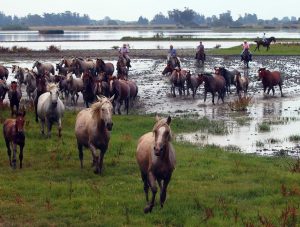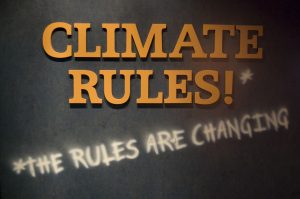Two recently issued decisions are important because they clarify how the formidably complex legal structure affecting a growing American business—the export of liquefied natural gas (LNG) –will be interpreted by the one federal Court of Appeals that has singular expertise in interpreting such requirements. On June 28, the U.S. Court of Appeals for the DC Circuit denied two petitions to review National Environmental Policy Act (NEPA) environmental issues affecting two separate FERC LNG export terminal facilities; the two cases are Sierra Club and Galveston Baykeeper v. FERC ( pertaining to the Freeport, Texas terminal ) and Sierra Club v. FERC (regarding the Sabine Pass Terminal). These cases were argued by and decided by the same attorneys and panel of judges. The Court of Appeals found that the petitioners had demonstrated sufficient standing, but the basic flaw in their argument seems to have been that FERC’s role is fairly circumscribed by law, and the major complaint was that the export of LNG would inevitable reduce the supply of natural gas for domestic purposes, thus increasing reliance on cheaper sources of energy such as coal.
Articles Posted in Environmental
DC Court: EEOC Guidance Final Action Subject to Review in Federal Court
A recent decision by the U.S. Court of Appeals for the Fifth Circuit is a reminder to important federal agencies that they must take care to adhere to the requirements of the Administrative Procedure Act (APA) when they issue not only new rules, but also other regulatory documents as well, and that the federal courts can, in appropriate cases, step into a controversy at an early stage. On June 27, the Fifth Circuit ruled, in a 2 to 1 opinion, that a 2012 Equal Employment Opportunity Commission (EEOC) Enforcement Guidance, entitled “Enforcement Guidance on the Consideration of Arrest and Conviction Record in Employment Decisions Under Title VII of the Civil Rights Act of 1964” was a final action, and the lower court erred in dismissing a declaratory judgment action filed by the State of Texas. The case is State of Texas v. Equal Opportunity Commission.
Saving P3 Projects in California
Today, my colleague Norman Carlin published an interesting piece discussing a pair of recent decision issued by the Fourth District Court of Appeal upholding a public-private partnership (P3) water project against two California Environmental Quality Act (CEQA) challenges. The two decisions are Delaware Tetra Technologies, Inc. v. County of San Bernardino, 247 Cal. App. 4th 352.(2016) and Center for Biological Diversity v. County of San Bernardino, 247 Cal. App. 4th 326 (2016). Norman’s alert is Saving Private Partnerships: Court Upholds P3 Project against CEQA Challenge under Save Tara.
Weekend Roundup of Environmental and Regulatory Law Developments
Recently there have been some interesting developments in environmental and regulatory law, including litigation, administrative and regulatory actions, and legislation. I’ve provided you with a little lite reading to ease into your week:
Litigation
The Supreme Court will review a U.S. Court of Appeals for the D.C. Circuit decision, in NLRB v. Southwest General, Inc., regarding the Federal Vacancies Reform Act, which determines when nominees for agency positions can serve in those positions while their nominations are pending in the Senate. This case involves a controversy affecting that NLRB’s Acting General Counsel. Because of the lower court’s ruling, many administrative decisions were imperiled. It may also affect the actions of EPA’s Acting Deputy Administrator.
More on Texas Accommodation Doctrine and Water Rights Disputes
In Texas Extends ‘Accommodation Doctrine’ To Groundwater, I provide a broader analysis of the issue presented in my earlier blog When Contract is Silent, Accommodation Doctrine Applies to Water Rights Disputes. 
Pillsbury summer associate Brittney Sandler made significant contributions to this article. Sandler is currently enrolled at Georgetown University Law Center where she serves as editor for the Georgetown Law Journal and as a legal research and writing fellow.
Photo: Greg Westfall, Just Another Day at the Park, Taken August 24, 2013 – Creative Commons
Federal Court Vacates Dep’t of Agriculture Guidance; Legislative Rule Requires Notice and Comment
On June 20, 2016, the U.S. District Court for the Northern District of California held, in Center for Environmental Health, et. al. v. Vilsack, that a United States Department of Agriculture (USDA) guidance document, intended to provide guidance with respect to the Organic Foods Act, was a legislative rule, not merely an interpretive statement of agency policy. The Act establishes the standards a product must satisfy to be labeled “organic.” The California Department of Food and Agriculture (CFDA) is certified by the USDA to administer the program in California, and in 2009, the California agency’s inspectors found detectable levels of bifenthrin in three compost products used in organic agricultural operations. Since the substance is not on a “National List” of approved synthetic substances, the USDA rules prohibit this use in compost products. In response to inquiries made by the manufacturer, the USDA issued the guidance document in question which allows the use of this substance under certain conditions.
Will SCOTUS Revisit Chevron Deference?
Chevron deference was an important factor in the U.S. Court of Appeals for the D.C. Circuit’s 180-page ruling, in United States Telecom Assoc. v. FCC, et al., on June 14 (Flag Day), upholding the Federal Communications Commission’s “Open Internet” rule. The Court of Appeals’ notes that “[f]or the third time in seven years, we confront an effort by the Federal Communications Commission to compel internet openness—commonly known as net neutrality—the principle that broadband providers must treat all internet traffic the same regardless of source.”
New Expansive Methane Regulation
In EPA Doubles Down with Expansive New Methane Regulation, Pillsbury attorneys Sheila McCafferty Harvey, David Lewis, Amanda Halter, Matthew Morrison, and Brendan Hennessey  discuss President Obama’s administration’s two recent, major steps in implementing its comprehensive climate change strategy. The Administration has set the first-ever methane emissions standards for new, reconstructed and modified sources and simultaneously begun a process to regulate existing methane emissions sources.
discuss President Obama’s administration’s two recent, major steps in implementing its comprehensive climate change strategy. The Administration has set the first-ever methane emissions standards for new, reconstructed and modified sources and simultaneously begun a process to regulate existing methane emissions sources.
Photo: Quenin Meulepas, Climate Rules!*, Taken March 23, 2008 – Creative Commons
NCDOT’s Use of Map Act Was a Taking Subject to Just Compensation
On June 10, 2016, the Supreme Court of North Carolina, in Kirby, et al., v. North Carolina Department of Transportation,  issued a unanimous ruling affirming the decision of the intermediate Court of Appeals that the North Carolina Department of Transportation’s (NCDOT) use of the state’s Roadway Corridor Official Map Act (Map Act) amounted to a taking of the plaintiff’s property without just compensation. On remand, the Supreme Court directed the lower court to determine the value of the loss of these fundamental rights in their property.
issued a unanimous ruling affirming the decision of the intermediate Court of Appeals that the North Carolina Department of Transportation’s (NCDOT) use of the state’s Roadway Corridor Official Map Act (Map Act) amounted to a taking of the plaintiff’s property without just compensation. On remand, the Supreme Court directed the lower court to determine the value of the loss of these fundamental rights in their property.
Sweeping Amendments Made to Toxic Substances Control Act
In A New Day in Chemical Regulation, Pillsbury attorneys Matt Morrison, Sheila McCafferty Harvey, Reza Zarghamee, and Brendan J. Hennessey discuss what you need to know about the “Frank R. Lautenberg Chemical Safety for the 21st Century Act”. The Act makes sweeping amendments to the Toxic Substances Control Act (TSCA). The long-awaited changes significantly strengthen EPA’s authority to take action to ban or restrict the manufacturing, processing, or use of chemicals that may pose an unreasonable risk of injury to human health or the environment.
 Gravel2Gavel Construction & Real Estate Law Blog
Gravel2Gavel Construction & Real Estate Law Blog


